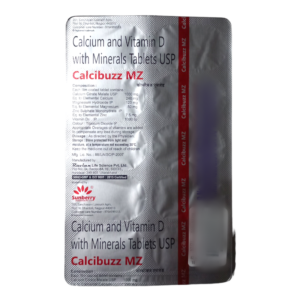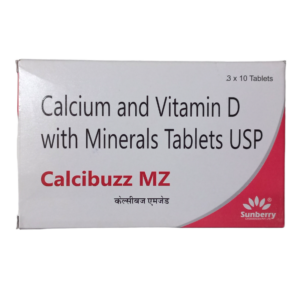MINERALS + CALCIUM CARBONATE + VITAMIN D
Minerals: Minerals are essential nutrients that are naturally found in the earth’s crust and are necessary for various physiological processes in the human body. While minerals are commonly obtained through diet, in some cases, mineral supplements may be prescribed.
The use of mineral supplements is primarily intended to address mineral deficiencies in individuals who cannot obtain adequate amounts of essential minerals through their diet alone. These supplements are often prescribed to correct deficiencies of minerals such as iron, calcium, magnesium, zinc, and potassium.
The mechanism of action of mineral supplements can vary depending on the specific mineral. For example, iron supplements work by replenishing the body’s iron stores, which are essential for the formation of red blood cells and the transportation of oxygen throughout the body. Calcium supplements help maintain strong bones and teeth and are involved in muscle contraction and nerve function. Magnesium aids in enzyme function and energy production, while zinc is necessary for immune system function and wound healing. Potassium is crucial for maintaining proper fluid balance, nerve function, and muscle contractions.
The dose of mineral supplements varies depending on the specific mineral, the individual’s age, sex, and health condition, as well as the severity of the mineral deficiency. It is essential to follow the prescribed dosage instructions provided by a healthcare professional or as indicated on the supplement packaging.
Side effects of mineral supplements can vary depending on the specific mineral and dosage. Some common side effects include gastrointestinal issues like constipation, diarrhea, nausea, and stomach cramps. Iron supplements, in particular, can cause black stools and may lead to constipation. Overconsumption of certain minerals, such as calcium, can result in kidney stones. It is important to discuss potential side effects and any existing medical conditions with a healthcare professional before starting any mineral supplement.
It is worth noting that obtaining minerals through a balanced diet is typically the best approach, and supplements should only be taken under the guidance of a healthcare professional when there is a documented deficiency.
Calcium Carbonate: Drug Name: Calcium Carbonate
Use: Calcium carbonate is a medication used to supplement calcium in the body. It is commonly prescribed to individuals with calcium deficiencies, such as those with osteoporosis, osteopenia, and hypocalcemia. It may also be used as an antacid to provide temporary relief of heartburn, indigestion, and upset stomach.
Mechanism of Action: Calcium carbonate works by providing calcium ions to the body. Calcium is an essential mineral required for various physiological functions, including maintaining healthy bones and teeth, muscle contraction, nerve function, and blood clotting.
Dose: The dosage of calcium carbonate varies depending on the specific medical condition and individual needs. As a dietary supplement, the recommended daily dosage for adults is usually around 1000-1300 mg of elemental calcium, divided into two or three doses throughout the day. For heartburn relief, the typical dosage is 500-1500 mg as needed, preferably after meals and at bedtime. It is important to follow the prescribed dosage instructions provided by the healthcare provider or as mentioned on the product label.
Side Effects: Calcium carbonate is generally well-tolerated when taken in appropriate doses. However, excessive calcium intake or prolonged use can lead to certain side effects, including constipation, bloating, gas, and an increased risk of kidney stones. Additionally, individuals with conditions such as hypercalcemia, kidney disease, or a history of kidney stones should consult a healthcare provider before starting calcium carbonate supplementation, as it may not be suitable for them. It is important to speak with a healthcare professional if any severe or persistent side effects occur.
Vitamin D: Vitamin D is a fat-soluble vitamin, and its active form is known as calcitriol. It is primarily used to treat or prevent vitamin D deficiency, which can lead to conditions like rickets in children and osteomalacia in adults. Additionally, it is sometimes used as an adjuvant treatment for certain conditions such as osteoporosis, hypoparathyroidism, and chronic kidney disease.
The mechanism of action of vitamin D involves the regulation of calcium and phosphate levels in the body. It facilitates the absorption of calcium from the intestines, ensuring its availability for bone health and other bodily functions. Vitamin D also promotes bone mineralization and modulates the immune system.
The recommended daily intake of vitamin D varies depending on age, gender, and specific conditions. For example, the recommended dietary allowance for vitamin D is 600 IU (International Units) for individuals aged 1-70 years and 800 IU for those over 70 years. However, individuals with vitamin D deficiency may require higher doses as prescribed by their healthcare provider.
Vitamin D is generally considered safe when taken within the recommended dosage range. However, excessive intake can lead to hypercalcemia (high levels of calcium in the blood), which can cause symptoms like nausea, vomiting, constipation, weakness, and frequent urination. Prolonged excessive intake can also lead to the buildup of calcium in the arteries and soft tissues, which may increase the risk of cardiovascular diseases.
It is important to note that vitamin D supplements should be taken under the supervision of a healthcare professional. They should not be used as a substitute for a balanced diet or sunlight exposure, which is a natural source of vitamin D synthesis in the body.


